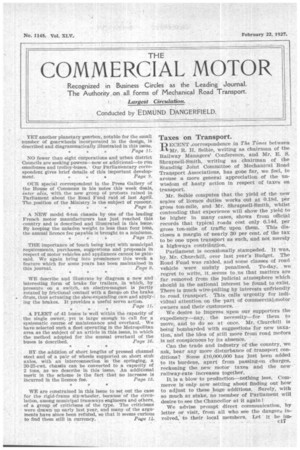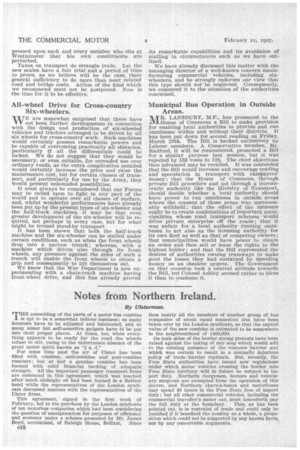Taxes on Transport.
Page 39

Page 40

If you've noticed an error in this article please click here to report it so we can fix it.
RECENT .correspondence in The Times between -1-14"Mr. R. H. Selbie, writing as chairman of the Railway Managers' Conference, and Mr. E. S.
Shrapnell-Smith, writing as chairman of the Standing Joint Committee of Mechanical Road Transport Associations, has gone far, we feel, to arouse a more general appreciation of the unwisdom of hasty action in respect of taxes on transport.
Mr. Seible computes that the yield of the new scales of licence duties works out at 0.18d. per gross ton-mile, and Mr. Shrapnell-Smith, whilst contending that experience will show the yield to be higher in many cases, shows from official records that typical roads cost only 0.14d. per gross ton-mile of traffic upon them. This discloses a margin of nearly 30 per cent, of the tax to be one upon transport as such, and not merely a highways contribution.
Parliament is occasionally stampeded. It was, by Mr. Churchill, over last year's Budget, The Road Fund was raided, and some classes of road vehicle were unduly penalized. To-day, we regret to write, it seems to us that matters are far removed from the judicial atmosphere which should in the national interest be found to exist. There is much wire-pulling by interests unfriendly to road transport. , This, calls urgently for individual attention on the part of commercial-motor owners and their customers.
We desire to impress upon our supporters the expediency—nay, the necessity—for them to move, and to do so at once. Mr. Churchill is being bombarded with suggestions for new taxation,' and the idea of still more from' road motors is not conspicuous by its absence. Can the trade and industry of-the country, we ask, bear any more disturbance of transport conditions? Some £10,000,000 has just been added to its burdens, apart from passing-on charges, reckoning the new motor taxes and the new railway-rate increases together.
It, is a blow to production—nothing less. Commerce is only now setting about finding out how to adjust to these huge additions. Surely, with so much at stake, no member of Parliament will desire to see the Chancellor at it again?
We advise prompt direct communication, by letter or visit, from all who see the dangers involved,' to their local members. Let it be fm
pressed upon each and every member who sits at Westminster that his own constituents are perturbed.
Taxes on transport do strangle trade. Let the new scales have a fair trial and a period of time to prove', as we believe will be the case, their general sufficiency to do more than meet related road and bridge costs. Action of the kind which we recommend must not be postponed. Now is the time for it to be effective.
All-wheel Drive for Cross-country Six-wheelers.
WE are somewhat surprised that there have not been further developments in connection with the design awl production of six-wheeled vehicles and tractors arranged to be driven by all six wheels for cross-country work. Such machines would certainly possess remarkable powers and be capable of overcoming practically all obstacles, particularly if all the differentials could be locked. We do not suggest that they would be necessary, or even suitable, for extended use over ordinary roads, as the extra complication entailed would certainly increase the price and raise the maintenance cost, but for certain classes of transport, and particularly for use by the Army, they would present unbounded possibilities.
It must always be remembered that our Forces may be called upon to fight in any part of the world and to operate over all classes of surface, and, whilst wonderful performances have already been put up by the present types of six-wheeler and the half-track machines, it may be that even greater development of the six-wheeler will be required, not perhaps in every case, but for what might be termed stand-by transport. It has been shown that both the half-track machine and the six-wheeler can be stalled under certain conditions, such as when the front wheels drop into a narrow trench ; whereas, with a machine which drives also through its front wheels, any pressure against the sides of such a trench will enable the front wheels to obtain a grip and consequently to lift themselves out.
We know that the War Department is now experimenting with a chain-track machine having front-wheel drive, and this has already proved its remarkable capabilities and its avoidance of stalling in circumstances such as we have outlined.
We have already discussed this matter with the managing director of a well-known concern manufacturing commercial vehicles, including sixwheelers, and he strongly endorses our view that this type should not • be neglected. Consequently, we commend it to the attention of the authorities concerned.
Municipal Bus Operation in Outside • Areas.
ivut. LA_NSBURY, M.P., has presented to the .a.LHouse of Commons a Bill to make provision for enabling local authorities to provide and run omnibuses within and without their districts. It has been put down for second reading on Friday, March 25th. The Bill is backed exclusively by Labour members. A Conservative member, Mr. Radford, it will be remembered, promoted a Bill for a similar purpose last session, but it was rejected by 133 votes to 128. The chief objections then advanced may be recalled. It was contended that the Bill would increase and encourage trading and speculation in transport with ratepayers' money ; that the House of Commons, through private Bill procedure and not through a bureaucratic authority like the Ministry of ,Transport, should decide whether a local authority should have power to run omnibuses in outside areas where the consent of those areas was unreasonably withheld ; that the effect of the measure might be to create combinations of important municipalities whose road transport schemes would drive private enterprise off the roads ; that it was unfair for a local authority running Omnibuses to act also as the licensing authority for its own fleet as well as that of competing owners ; that municipalities would have power to obtain an order and then sell or lease the rights to the highest bidder ; and that the Bill represented the desires of authorities owning tramways to make good the losses they had sustained by spending money on an obsolete system. The Government on that occasion took a neutral attitude towards the Bill, but Colonel Ashley seemed rather to bless it than to condemn it.












































































































